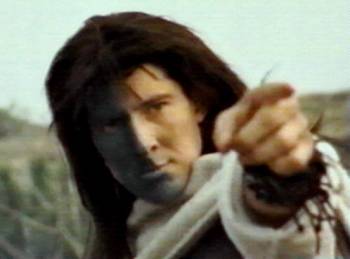Throughout this semester, I kept meaning to make blog posts about my random media observations, so there will be an influx of seemingly random 500(or so)-word dissections of the stuff that has crossed my mind that I haven’t gotten around to talking about. Mostly TV, because that’s how I roll. First up, Doctor Who.
I have this obsession with immortal/long-lived characters, probably from a childhood spent bingeing on comic books and fantasy novels. I never had a time-travel fantasy as a kid, because I had an inkling that “black” and “woman” were not going to serve me well in most of the places that the characters I liked traveled to, but I still loved the concept. So Doctor Who and Highlander were go-to media products for me as a kid and teenager, and the New Doctor Who has been one of my favorite shows. Here’s the thing I find interesting in watching Doctor Who now that I didn’t as a kid: extended age, with all its attendant implications of wisdom and experience, is a white male domain. Yes, I get it, when you’re casting a UK/US show, your protagonist is a white guy. I’m not talking about the reasons for why this happens, I’m talking about the values it imparts to the show and how those casting strictures end up constructing a certain reading of those qualities.

On Highlander (the TV show), there was a character named Methos who was 5000 years old. He was a recurring character, and most of the storylines involving him used him to make a point about we poor benighted mortals and how we spent too much time on the wrong things, and how he’d lived, you see, so he could understand that our petty differences were insignificant. The casting was apparently race-blind, and they just happened to find a white guy who was the best for the part (in British Columbia. I know you’re shocked). The interesting thing here in terms of how whiteness is constructed is that it is an unmarked category. The character is placed in all kinds of situations across 5 millennia and he is always accepted without question, and rarely with a discussion of, “hey, what’s that white dude doing here?”
This works to normalize the idea of default whiteness, where of course a white man can enter any situation and not have to worry about his cultural position relative to his surroundings. The characters who occupy a different cultural position are guest stars, not POV characters, and they are not meant to be part of the fantasy role-playing for the audience. The show places the audience at the same level as the main characters (all but one of whom are white men, the last is a white woman), and says, “you could be here! If you found yourself in 9th century China as a white guy, everyone would think you were just one of the gang!” Highlander serves as just one more example of how one of the insidious parts of default whiteness in casting is that it frequently makes no sense and blinds the audience to the fact that the people who are not white are also protagonists in their own story that the current text is just not telling.
 Doctor Who, which prompted this rant, is a slightly different case because there has been discussion about casting the character with a non-white actor. Oddsmakers were laying bets on Paterson Joseph before the last casting decision (and he would’ve been awesome.)
Doctor Who, which prompted this rant, is a slightly different case because there has been discussion about casting the character with a non-white actor. Oddsmakers were laying bets on Paterson Joseph before the last casting decision (and he would’ve been awesome.)

My problem with Doctor Who is not so much the default whiteness, because, at least in the new series, people talk about race! The black girl says, “oh hey, is it safe for me to be here?” like I expect I would say when transported to the past in Europe. Where the issue for me comes in is the buildup of a national mythological figure, who is presented as nearly omniscient, and is always embodied in a white male figure. And embodied in increasingly young white male figures as time goes on. It isn’t a problem with the actors. In fact, the most recent incarnation is a 26-year-old, and I find him more believable as a character his age (over 900) than previous actors. The issue is that it’s taken for granted that these characters will be believable, and the argument against a woman or a person of color among fans is frequently that they would not believe the character were it not a white man. It’s never stated directly that there’s an assumption of authority in that particular body, but it’s underlying in the outrage against other options (alongside the racism and misogyny.)
What I wonder is where I stand in terms of accepting the characters that don’t fit this paradigm. When reading about characters who aren’t white men who live long lives or are immortal, I have little problem accepting the character. But when watching these characters, I find myself thinking, “Is anyone going to treat them unfairly? Will someone call attention to their race/sex? Is it safe to be that person is that position?” The process of seeing the character makes them more embodied for me, and cuts off options for imagination. And reveals that the extent to which I’ve accepted the concept of whiteness and maleness enabling one to move in the world freely is really disturbing.







